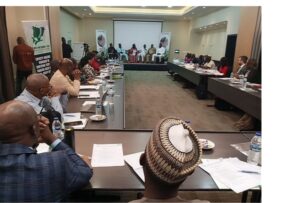The maiden edition of the conference on Banks and Civil Society in Nigeria co-organized by Spaces for Change | S4C and the Special Control Unit Against Money Laundering (SCUML) united stakeholders from the public and private sectors comprising the Central Bank of Nigeria, commercial banks, financial crime regulators, corporate governance regulators, donor agencies, non-profit organizations (NPOs) and independent experts in anti-money laundering and countering financing of terrorism (AML/CFT) to discuss the role of banks and other financial institutions (BOFIs) in improving the operating environment for civil society organizations in Nigeria. The conference provided a platform for the central and commercial banks to understand the operational challenges arising from applying AML/CFT measures to charitable entities. CSOs from around the country shared experiences regarding limitations in accessing banking services, particularly in conflict-affected regions; overregulation; financial exclusion; and bureaucratic hurdles linked to obtaining SCUML certifications and regularising corporate governance changes. These limitations underscore the need for reforms in policy and practice to facilitate financial inclusion and enhance the delivery of humanitarian assistance.
Another major concern relates to the high cost of regulatory compliance and bank charges for banking services. Many NPOs operate with limited budgets and heavily rely on voluntary contributions. In some countries, a significant percentage of NPOs operate solely on volunteer efforts, making it impractical to satisfy cumbersome compliance requirements. Imposing stringent regulations on NPOs without considering their financial realities can lead to their inability to comply or operate legally. To make matters worse, most banks categorize NPOs as high-risk. This blanket generalization is not only unfounded but is also inconsistent with the findings of the national terrorism financing risk assessment of NPOs conducted by SCUML in 2022 which showed that only a few subsets of NPOs are high-risk. A detailed presentation from SCUML about the TFRA results enlightened banks about the risk profile of NPOs operating in different parts of the country. The hard evidence presented to stakeholders was compelling, culminating in the broad consensus on the need for a more refined and balanced approach to NPO regulation.
Understandably, financial institutions operate in a complex regulatory environment with the threat of substantial fines for non-compliance. They often operate within unclear regulatory frameworks and face significant compliance risks, consequently leading to a one-size-fits-all approach to the application of AML/CFT control measures across sectors, including NPOs. An independent expert from GreenAcre Associates walked the BOFIs through the newly revised requirements of the Financial Action Task Force’s (FATF’s) Standards relating to NPOs. Under the revised FATF’s Recommendation 8, banks and other financial institutions are required to adopt a risk-based approach, assess individual customer (NPO) risks, engage NPOs to understand their needs and mitigate risks effectively. The revised FATF R8 Best Practice Paper also recommends targeted outreach to the NPO sector. While banking procedures and controls are necessary to enhance the integrity of financial systems, it is equally imperative to ensure that regulatory measures enhance the essential work of NPOs. Implementing proportionate and targeted measures, based on risk assessments, is key to striking a balance between compliance and operational viability for NPOs.
Moving forward, sustained engagement and cooperation between banks, NPOs, and regulators are essential to addressing the financial access needs of NPOs while safeguarding against illicit financial activities. While global guidance from organizations like FATF provides a framework, local stakeholders must take the lead in finding and implementing solutions tailored to the local context. By finding the right balance between compliance and operational realities, they can ensure the continued vitality of the non-profit sector to serve and reach communities in the greatest need. The conference was organized with support from the Global Center on Cooperative Security (GCCS), and the Fund for Global Human Rights (FGHR).





















